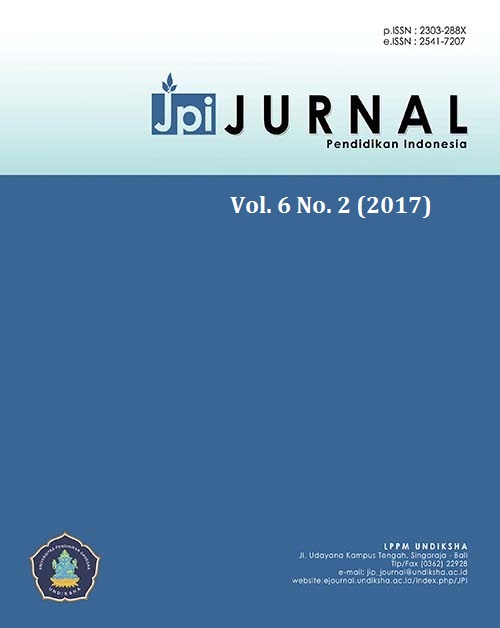Task-Based Training Materials For Ecotourism
DOI:
https://doi.org/10.23887/jpi-undiksha.v6i2.10967Keywords:
ecotourism, training materials, tasksAbstract
This study aimed at developing training materials for ecotourism at Sambangan village.This research was a research and development using modified Borg and Gall design (2003). There were some steps conducted in order to develop the training materials namely; need analysis, design first draft, expert judgment, revision I, field test, revision II, and final product. There were four instruments applied to obtain the research data, observation, document study, questionnaire, and interview guide. The findings were described descriptively. The results of this study found that (i) the tour guides needed tasks-based training materials that could improve their speaking skill, (ii) developed training materials based on tasks of the members of kelompok sadar wisata had been evaluated as excellent materials, (iii) The developed training materials was readable, implementable, and measurableReferences
Ballantyne, R., & Hughes, K. 2001. Interpretation in ecotourism settings: Investigating tour guides’ perception of their role, responsibilities and training needs. The Journal of Tourism Studies, 12(2), 2-9.
Berns, R.G., & Erickson, P.M. 2001. Contextual Teaching and Learning: Preparing Students for the New Economy. Retrieved from http://www.cord.org/uploadedfiles/NCCTE_Highlight05-ContextualTeaching Learning.pdf
Borg, W, R., & Gall, M, D. 2003.Educational Research.(7rd).New York:Longman
Candiasa, I. M. 2010.Pengujian Instrumen Penelitian Disertai Aplikasi. Singaraja: Universitas Pendidikan Ganesha.
Cercone, K. 2008. Characteristics of adult learners with implications foronline learning design, AACE Journal, 16(2), 137-159.
Cooper, N. 1999.Tourism: Principles and Practice. Pearson Education Limited. England
Ellis, R. 2006. The Methodology of Task-Based teaching. Asian EFL Journal, 8(3), 46-68.
Eplerwood, W. 1999.EkonomiPariwisata. PT. GramediaPustakaUtama.Jakarta.
Frey, B.A., &Alman, S.W. 2003. Applying adult learning theory to the online classroom. New Horizons in Adult Education, 17(1), 4-12.
Harsono, Y. M. 2007. Developing learning materials for specific purposes.TEFLIN Journal, 18(2), 169-179.
Hutchinson, T. & Waters, A. 1987.English for Specific Purposes: A Learning Centred Approach. Cambridge: Cambridge University Press.
Listiari, I, G. 2016.Practical Bilingual Vocabulary for POKDARWIS TunjungMekarSambangan.Unpublished Thesis. Universitas Pendidikan Ganesha
O’Brien, T., & Ham, H, S. 2012.Toward Professionalism in Tour Guiding - A Manual for Trainers.University of Idaho: United States Agency
Ramendra,D.,P & Ratminingsih, N.,M. 2007. Pemanfaatan audio visual aids (AVA) dalam proses belajar mengajar mata pelajaran bahasa inggris di sekolah dasar. JurnalPenelitiandanPengembanganPendidikan, 1(2),78-95.
Sadtono, E. 1997.ELT Development in Indonesia: a Smorgasbord. In Sadtono, E. (Ed.), The Development of TEFL in Indonesia . The English Department of IKIP Malang in collaboration with BinaBudaya Foundation. IKIP Malang.
Saputri, T.,S.,W. 2013. Developing Learning English Module for Mount Merapi Lava Tour Guides InDesaWisataKembang Arum DonokertoTuriSleman. Yogyakarta State University
Simion, M. O. 2012. The Importance of teaching english in the field of tourism inuniversities. Academic Brancusi, 2(12), 152-154.
Tomlinson, B. 1998.Materials Development in Language Teaching. Cambridge University Press
Undang-Undang No. 10 Year 2009 about Tourism Industry
Wynne, R. 2012. Characteristics of Adult Learners. Lerner Centered Methodologies, Retrieved from http://www.assetproject.info/learner_methodologies/before/ characteristics. html
Downloads
Published
Issue
Section
License
Authors who publish with the Jurnal Pendidikan Indnesia agree to the following terms:
- Authors retain copyright and grant the journal the right of first publication with the work simultaneously licensed under a Creative Commons Attribution License (CC BY-SA 4.0) that allows others to share the work with an acknowledgment of the work's authorship and initial publication in this journal.
- Authors are able to enter into separate, additional contractual arrangements for the non-exclusive distribution of the journal's published version of the work (e.g., post it to an institutional repository or publish it in a book), with an acknowledgment of its initial publication in this journal.
- Authors are permitted and encouraged to post their work online (e.g., in institutional repositories or on their website) prior to and during the submission process, as it can lead to productive exchanges, as well as earlier and greater citation of published work. (See The Effect of Open Access)








